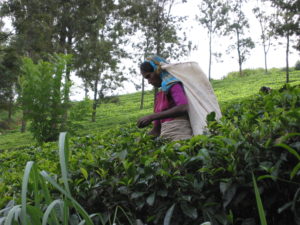 Devastating crises arising out of natural disasters and violence exacerbate food insecurity for a large number of people in developing countries. To address this cause of hunger and malnutrition, WFP and IFPRI turned their attention to building the poor’s resilience to shocks.
Devastating crises arising out of natural disasters and violence exacerbate food insecurity for a large number of people in developing countries. To address this cause of hunger and malnutrition, WFP and IFPRI turned their attention to building the poor’s resilience to shocks.
After a tsunami hit Sri Lanka in 2004, WFP faced the challenge of administering one of the largest cash transfer initiatives ever. Moreover, the Sri Lankan government had concerns about completely substituting cash for food transfers. In response, WFP and the government designed a pilot program that provided either cash or food to the 1 million people affected. IFPRI was invited to compare the two aid types and their impacts on recipients’ food and livelihood security and on the local economy. IFPRI’s evaluation found that cash transfers were successful in increasing dietary diversity and reached the poor more quickly because local banks already had the capacity to distribute cash efficiently. The study provided concrete evidence that cash transfers, under certain conditions, are more effective in times of crisis, supporting WFP’s use of cash transfers. Based on the success of this project, WFP contracted IFPRI a year later to evaluate the WFP Cash and Food for Livelihoods Pilot in the Machinga and Chikawa districts in Malawi using a similar research approach. IFPRI found that cash transfers increased food consumption and diet diversity. However, cash transfers can potentially be more costly to administer in these districts than food aid during the lean season. Because the local market is not integrated with the international market, at times local food prices can exceed the costs for WFP to procure food in the international market for distribution.
Violence and conflict are also threats to food security in developing countries, which was the case in Liberia in the 1980s and 1990s. But in 2006, the Liberian people elected a new government that raised hopes of curbing violence, human rights abuses, and economic mismanagement. In an attempt to bring stability and spur development in Liberia, the new government partnered with the WFP Liberia Country Office and IFPRI in 2007 to develop a national framework centered on achieving food security and improving nutrition for all Liberian households. IFPRI’s collaboration with WFP-Liberia and the government yielded the first Food Security and Nutrition Strategy (FSNS) for Liberia, which was approved and enacted by the government in 2008. Today, this framework remains one of the two principal policy documents guiding public investments, action on food and agriculture, and nutrition intervention in Liberia. The FSNS also helped set priorities for the country’s first full Poverty Reduction Strategy—the master development framework for Liberia.
For more information on IFPRI's work in partnership with WFP, please go to this brochure.


